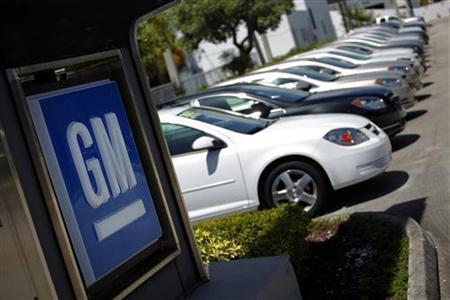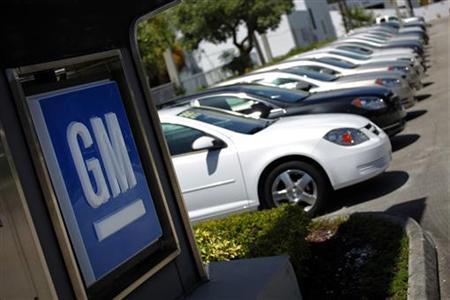
With an eye on the emerging markets of Brazil, China, India and Mexico, American auto manufacturer General Motors is developing new family of vehicles and plans to roll out the new models by 2019.
The third largest car manufacturer of the world, General Motors has made provision to invest $5 billion for this purpose. The consumer markets of Brazil, China, India and Mexico are viewed as the world's fastest-growing emerging auto markets.
The vehicles planned to be developed by General Motors would include compact car and small crossover utility vehicles and would be sold under the Chevrolet brand.
“The fundamental story here is one of growth,” said Dan Ammann, president of General Motors. The company has set a target of achieving an annual sale figure of two million vehicles after their plan for high growth in the emerging markets is executed.
“We believe from an investor stand point that it's important that we are placing bets in growth areas for the company, that we're growing the business, but that we're doing that in a profitable way and earning the right kind of returns on capital," Ammann said.
While describing the cars to be "global growth cars”, General Motors declined to provide further details about the specific types of models it is planning or the price at which they will be sold.
There has been a spate of retrenchments in the company in the recent years as the company has even stopped production in some foreign markets including Russia and Australia. Announcements have also been made by the company to limit their operations in certain countries like Thailand and Indonesia where the company has not been able to make profits from its operations on a consistent basis.
This move by the auto giant is seen as an effort to counter the slump in sale and streamlining its operations to maximize operational profits.
The choice for the company of targeting the emerging market for expanding business instead of fighting out in the developed markets is very clear.
“The central theme here is starting with what we think will be the customer requirements in different markets and working backwards from there to figure out how we deliver to those requirements at a value point that will allow us to make a good return on our investment,” said Aamann.
As a strategy, the company is sharing the development costs with its joint venture partner SAIC Motor of China. The engine and vehicle family core architecture would be jointly developed by the two companies. Like many of its competitors in the industry, General Motors is also trying to streamline the production process by reducing the number of different architectures or platforms used to build vehicles. This helps companies to save on operational expenses and maximizing the efficiency of their global operations.
Even as the concept of consolidated platforms seems fairly simple, car manufacturers are struggling to meet the time demands of different markets with different requirements for vehicle safety, fuel efficiency and other factors. This has forced the auto manufacturers to streamline operations in far-flung markets in order to save on operational costs.
The plans have been bolstered by good second quarter results of the company announced last week where it announced $2.9 billion in profit. However, the significant contribution to this figure has been the company’s good performance primarily in the US and China markets, two of the largest auto markets of the world.
(Source: www.cmbc.com)
The third largest car manufacturer of the world, General Motors has made provision to invest $5 billion for this purpose. The consumer markets of Brazil, China, India and Mexico are viewed as the world's fastest-growing emerging auto markets.
The vehicles planned to be developed by General Motors would include compact car and small crossover utility vehicles and would be sold under the Chevrolet brand.
“The fundamental story here is one of growth,” said Dan Ammann, president of General Motors. The company has set a target of achieving an annual sale figure of two million vehicles after their plan for high growth in the emerging markets is executed.
“We believe from an investor stand point that it's important that we are placing bets in growth areas for the company, that we're growing the business, but that we're doing that in a profitable way and earning the right kind of returns on capital," Ammann said.
While describing the cars to be "global growth cars”, General Motors declined to provide further details about the specific types of models it is planning or the price at which they will be sold.
There has been a spate of retrenchments in the company in the recent years as the company has even stopped production in some foreign markets including Russia and Australia. Announcements have also been made by the company to limit their operations in certain countries like Thailand and Indonesia where the company has not been able to make profits from its operations on a consistent basis.
This move by the auto giant is seen as an effort to counter the slump in sale and streamlining its operations to maximize operational profits.
The choice for the company of targeting the emerging market for expanding business instead of fighting out in the developed markets is very clear.
“The central theme here is starting with what we think will be the customer requirements in different markets and working backwards from there to figure out how we deliver to those requirements at a value point that will allow us to make a good return on our investment,” said Aamann.
As a strategy, the company is sharing the development costs with its joint venture partner SAIC Motor of China. The engine and vehicle family core architecture would be jointly developed by the two companies. Like many of its competitors in the industry, General Motors is also trying to streamline the production process by reducing the number of different architectures or platforms used to build vehicles. This helps companies to save on operational expenses and maximizing the efficiency of their global operations.
Even as the concept of consolidated platforms seems fairly simple, car manufacturers are struggling to meet the time demands of different markets with different requirements for vehicle safety, fuel efficiency and other factors. This has forced the auto manufacturers to streamline operations in far-flung markets in order to save on operational costs.
The plans have been bolstered by good second quarter results of the company announced last week where it announced $2.9 billion in profit. However, the significant contribution to this figure has been the company’s good performance primarily in the US and China markets, two of the largest auto markets of the world.
(Source: www.cmbc.com)





